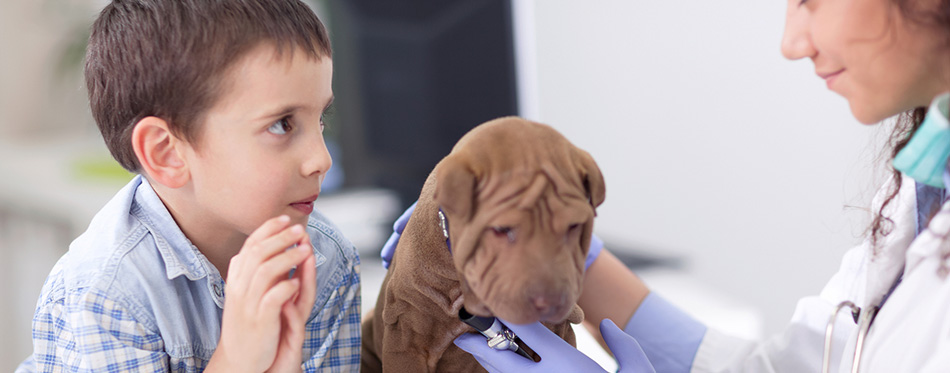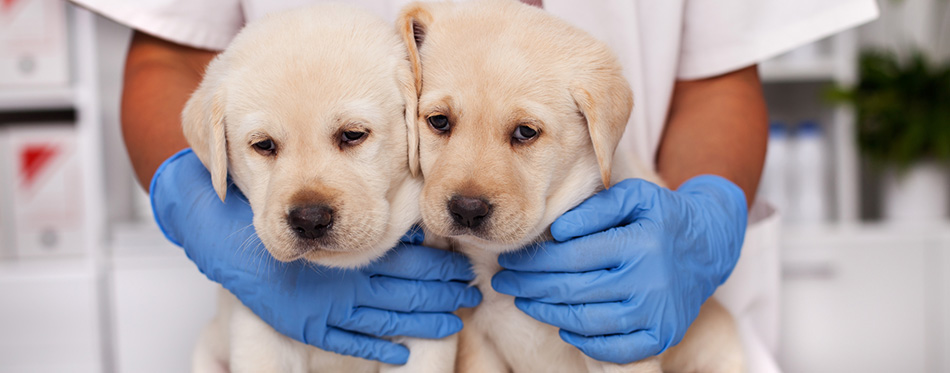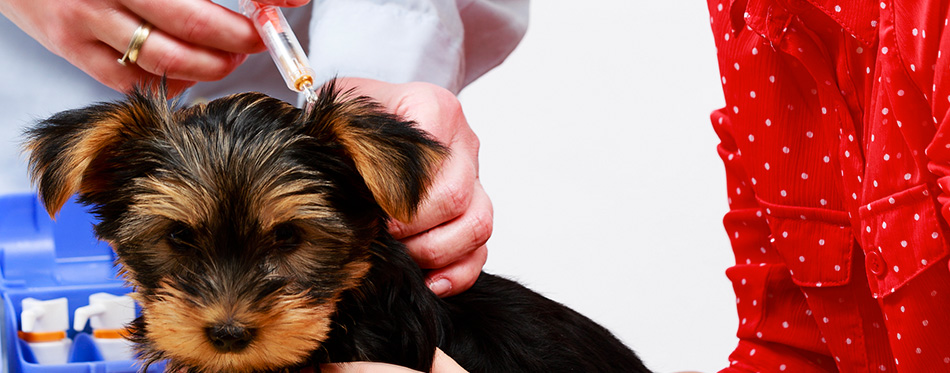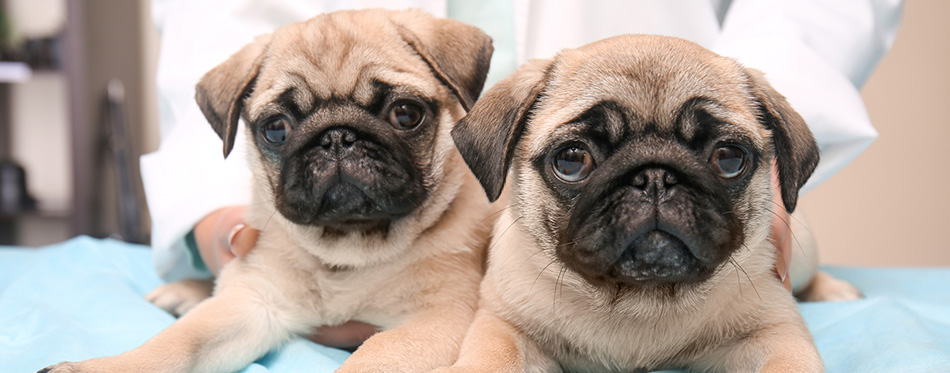Puppies, like babies, are at a critical point in their lives when they’re most vulnerable to certain diseases. Good nutrition that is started early can help provide for healthier and more robust growth and development. However, there are certain diseases that can undermine a puppy’s normal growth and development. It is, therefore inherent in every pet parent to protect their puppies from these highly-preventable diseases. Vaccination safeguards the growth and development of the young dog. It helps ensure that your puppy will grow into a healthier dog, living its full potential.

A Look at How Vaccines Work
In general, vaccines are biological formulations. They are antigens that stimulate the immune system to produce antigen-specific antibodies. These antigens can be whole microorganisms like bacteria and viruses. They can also be certain components of these microorganisms.
These antigens come in very minute or small amounts. You don’t want the amount of antigen to be so low that it will not stimulate the production of antibodies. You also don’t want the amount to be too high that the dog gets the full-blown infection and disease.
As the dog’s immune system fights the antigen, some immune system cells will make a copy of the antibodies used in the fight. This will serve as a blueprint for the production of future antibodies against such antigens should they enter the dog’s system again.
This is the very essence of vaccines. They prepare your dog in fighting certain diseases. If your dog gets exposed to an antigen that it already has antibodies to, then the infection will not proceed. This is how vaccines can prevent diseases.
Importance of Vaccination for Puppies
Since vaccines stimulate the dog’s immune system in the production of antigen-specific antibodies, this makes it a more efficient system when a real antigen comes along. The immune response to such a pathogen is swift, efficient, and decisive. This underscores the importance of vaccination for puppies. There are other benefits, too, such as the following:
- Reduces the Number of Diseases that Can Affect Your Dog
It is important to recognize that vaccination provides very specific protection against a specific pathogen. Hence, you cannot expect that a rabies vaccine will protect your dog from another disease. This vaccine will only protect it against the pathogen for which the dog’s immune system has antibodies to.
Vaccinations can prevent a number of canine diseases such as canine distemper, kennel cough, encephalitis, and hepatitis, among others. This can have substantial implications in your puppy’s growth and development. By preventing the development of these diseases, you are ensuring optimum growth for your pup. They can grow into healthier and happier dogs.
- Avoid Costly Veterinary Treatments
A natural offshoot to preventing diseases is the avoidance of costly veterinary treatments. Take kennel cough for instance. This may look like a benign health condition in dogs, but it can also lead to secondary infections which may require extensive hospitalization and more aggressive treatments using antibiotics. You will also have to consider the cost of ongoing treatment plus the vet’s professional fees.
Like diseases among humans, treating diseases in dogs requires pet parents to shell out money from their savings. It’s good if you have pet insurance. But for pet parents who don’t have insurance for their pet dogs, treatment can cost them anywhere from a hundred dollars to a few thousand dollars. One also has to take into consideration the emotional and psychological burden of having a sick dog. It is a very costly affair, mind you.
- Prevent Disease Transmission
Dogs are both carriers and hosts of pathogens. Some pathogens only take up temporary residence in the dog before they settle in on a more definitive host. Dogs that have active infections can also transmit the microorganism to others through their excrement, saliva, and other body fluids. For instance, dogs with intestinal parvovirus can pass the virus in the feces. When another dog sniffs or licks the ground where fecal matter is located, it is possible that it will also ingest the parvovirus. This dog can also get parvovirus infection.
Not only are these diseases a threat to other animals. They can also be a threat to you, your family, and other individuals. Kids playing in your background can get in contact with contaminated soil. Being curious kids, they can “taste” the soil or somehow put their dirty hands in their mouths. This can lead to health problems as well.
- Required by Law
Municipalities, cities, and states now have specific legislations requiring the vaccination of pets against rabies and other diseases. When you vaccinate your pet dog, you are complying with the law. This makes you a good member of society.
This also has implications in society, in general. You are also being a responsible member of society by making sure your dog will not transmit any disease to other humans.

Your Puppy’s Schedule of Vaccine Shots
Here are the vaccines that your puppy will have to receive in the first 2 years of its life.
- 6 to 8 Weeks
Puppies that are 6 to 8 weeks old need vaccines against Parainfluenza and Distemper. You can also give them an optional Bordetella vaccine.
- 10 to 12 Weeks
Vaccines against Distemper, Adenovirus, Parvovirus, and Parainfluenza are given to puppies between the ages of 10 and 12 weeks. The Adenovirus component of the multivalent vaccine addresses canine hepatitis. As such, veterinarians call this group of vaccines as DHPP. There are also optional vaccines against Coronavirus, Lyme disease, Bordetella, and Leptospirosis.
- 12 to 24 Weeks
Puppies at this point in their lives need their first dose of rabies vaccine.
- 14 to 16 Weeks
Puppies between the ages of 14 and 16 weeks can receive another dose of DHPP as well as optional vaccines against Lyme disease, Coronavirus, and Leptospirosis.
- 12 to 16 Months
Puppies that are in this stage of their lives need another shot for rabies and DHPP. They may also benefit from shots against Coronavirus, Lyme disease, Bordetella, and Leptospirosis.
These are the vaccine shots that puppies need to receive in the first two years of their lives. Some of these are optional, of course. Subsequent booster doses are often given once every 1 to 2 years. This is in the case of DHPP, Coronavirus, Bordetella, Leptospirosis, and Lyme disease. As for rabies, the law requires boosted doses once every 1 to 3 years, depending on which jurisdiction you reside.

Mandatory Vaccinations in Puppies
There are certain vaccines that are an absolute must for all puppies and dogs. These are as follows.
- Distemper
Canine distemper is a serious viral infection that has a very high mortality rate among puppies. The virus that causes distemper in dogs belongs to the same family of viruses that cause measles in humans. It can affect different organ body systems such as the dog’s gastrointestinal tract, the brain, the spinal cord, and the respiratory tract. This can result in very high fever, difficulty breathing, diarrhea, lethargy, and loss of appetite. It can also result in immunosuppression, which can allow for secondary bacterial infections to develop.
Puppies between ages of 3 and 6 months are vulnerable to canine distemper. More than 80 percent of puppies with distemper die because of the infection. The virus spreads by direct contact with infected body fluids such as feces, vomitus, and respiratory discharges. The virus can also spread via the dog’s urine, eye and nose secretions, and food and water.
Puppies from the age of 6 weeks up to 8 weeks can already receive their distemper shots. There are three booster shots given to a puppy. The first is 3 weeks after the first distemper shot. The second is 3 weeks after the first booster dose. By the time the puppy reaches the 12th month, it is ready for its third booster dose.
- Parvovirus
There is reason to believe that the canine parvovirus is a mutant virus originating from the feline panleukopenia virus in cats. This viral infection is very contagious, with a mortality rate reaching as high as 91%. There is only one mode of transmission of the virus – contact with contaminated feces, whether it’s direct or indirect. It is also possible to transmit parvovirus from an infected dam to its puppies. Although this mode of transmission is rare, it does happen. In such cases, puppies inside the dam’s womb can get the virus.
Canine parvovirus can produce lethargy, bloody diarrhea, fever, vomiting, and loss of appetite. The severe vomiting and diarrhea often lead to dehydration and electrolyte imbalance. There is also a reduction in immune functioning. This favors the development of secondary bacterial infections. Compromise to the intestinal wall leads to loss of protein and anemia. Endotoxins can also escape into the dog’s bloodstream. This produces endotoxemia. This can lead to septic shock and the dog’s death.
Parvovirus shots follow the schedule of distemper vaccination. The initial shot is given between the ages of 6 and 8 weeks and boosted 2 times at 3-week intervals. The final booster is in the 12th month of the puppy’s life.
- Adenovirus
This virus is responsible for the development of infectious canine hepatitis. The virus spreads via the urine, saliva, feces, nasal discharge, and blood of an infected dog. It affects the dog’s kidneys and liver, which can produce fever, abdominal tenderness, cough, loss of appetite and depression. As damage to the liver worsens, the dog develops jaundice and hepatic encephalopathy. More severe cases can also cause bleeding disorders. The combination of encephalopathy and bleeding disorder often lead to the death of the dog.
The vaccination schedule of puppies against adenovirus follows that of both distemper and parvovirus. Vaccination starts at 6 to 8 weeks, followed by 2 booster doses at 3-week intervals. The final booster is on the puppy’s 1st birthday.
- Rabies
This virus causes severe inflammation of the brain. It can lead to violent movements, fear of water, and uncontrolled excitement. Over time, it progresses to confusion, paralysis, and loss of consciousness. It always terminates with the death of the dog.
Vaccinating your puppy can start at the age of 12 weeks. A booster dose is often given by the 12th month in the puppy’s life. Booster shots are then administered every 1 to 3 years, depending on the existing laws in your location.
- Parainfluenza
Parvoviruses cause kennel cough. One should understand that kennel cough can also be due to a bacterium, the Bordetella bronchiseptica. Very young puppies, senior dogs, and dogs with compromised immune systems are at risk of developing Parainfluenza infections. Parainfluenza kennel cough produces a severe hacking cough, conjunctivitis, rhinitis, and fever.
Parainfluenza virus shots follow the schedule of distemper, adenovirus, and parvovirus. This means that the shots start by the age of 6 to 8 weeks, then 2 booster shots at 2 to 4-week intervals. A final booster dose is often administered on the 12th month of the puppy’s life.
Check out our guides on Dog Vitamins and Dog Thermometers for more info.

Optional Vaccinations for Puppies
Aside from the mandatory vaccinations, puppies can also benefit from the following optional shots.
- Bordetella
Bordetella bronchiseptica is the bacterium that causes bacterial kennel cough. Puppies can get Bordetella shots starting at 6 to 8 weeks, followed by a booster dose after 3 to 4 weeks. There is another booster by age 1 year.
- Coronavirus
This virus can produce mild gastrointestinal symptoms. However, there are also cases of respiratory infections. The first dose of coronavirus vaccine can be given at 10 weeks of age, followed by a booster after 4 weeks. Another booster is given between 12 to 16 months of age.
- Leptospirosis
This infection can lead to muscle pain, severe weakness, jaundice, and kidney failure. The vaccination of puppies against leptospirosis follows the schedule for coronavirus.
- Lyme Disease
Borrelia burgdorferi causes Lyme disease. This spirochete comes from black-legged ticks common in the US Northeast. It can produce mild symptoms. However, there are cases where the dog also develops neurologic problems. The typical schedule for puppy vaccination against Lyme disease coincides with the vaccination against coronavirus and leptospirosis.
Vaccination may not prevent your puppy from getting sick, but it sure can protect it from some of the more serious canine diseases. It is a more cost-effective solution than waiting for these diseases to occur.

